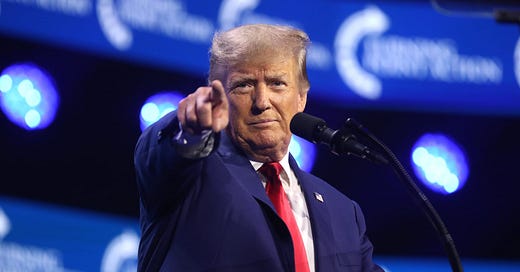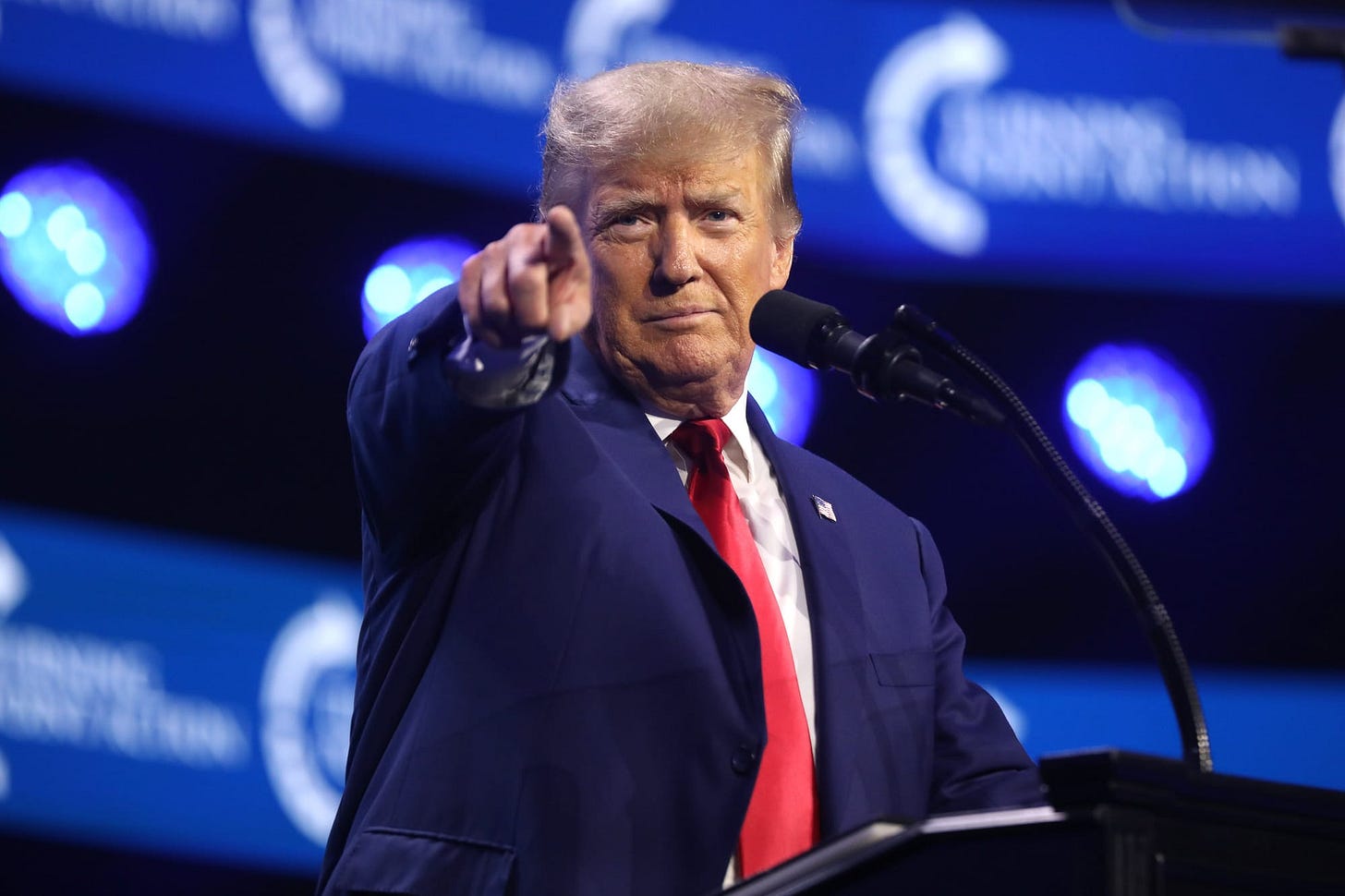Breaking down Trump’s immunity case
This is the first time a court has ever been asked to rule on whether a former president can be prosecuted.
Good morning! It’s Thursday, April 25, 2024. Election Day is 194 days away. If this newsletter was forwarded to you, subscribe here. If you want to contribute to support my work, donate here.
America’s Founders were, by all accounts, obsessed by the idea of a corrupt commander-in-chief rising to power.
Having just fought a war against a king, they were terrified of an executive who would abuse his powers or engage in criminality. The Declaration of Independence, after all, is essentially a 27-count indictment of King George III for his crimes against the colonists.
Instead of using war to prosecute their next misbehaving leader, they implemented the process of impeachment to peaceably remove a president who broke the laws. “No point is of more importance than that the right of impeachment should be continued,” Virginia delegate George Mason said at the Constitutional Convention. “Shall any man be above Justice?”
In Federalist No. 65, Alexander Hamilton imagined further means of accountability for an impeached-and-convicted president. “The punishment, which may be the consequence of conviction upon impeachment, is not to terminate the chastisement of the offender,” he wrote. “After having been sentenced to a perpetual ostracism from the esteem and confidence, and honors and emoluments of his country; he will still be liable to prosecution and punishment in the ordinary course of law.” Article I of the Constitution says similarly.
Considering that level of forethought, it’s odd that there’s so little record of the Framers considering a conundrum that seems obvious in hindsight: What about a president who hasn’t been impeached and removed from office? Can they also face legal consequences for misdeeds committed during their tenure? The Constitution and the Federalist Papers are both silent on this question, neither laying out circumstances in which a former president can face criminal charges nor explicitly giving them immunity from prosecution.
Perhaps the Founders simply had faith that the impeachment process — even with its high bar for conviction — would be sufficient to catch any crooks in the White House. In their new government, they planned for the primary mode of political competition to be between branches, not parties. Maybe they simply couldn’t imagine a world where members of Congress would work to protect a criminal president because of shared political interests, instead of seeking to constrain them due to the competing interests of their institutions.
Or maybe, as the legal scholar Garrett Epps has suggested, they refrained from discussing the matter out of deference to George Washington, in whose image the presidency was shaped. “Washington’s force of personality terrified almost all of his contemporaries, and although he said little as [president of the Constitutional Convention], he was not always quiet,” Epps has written. Perhaps it would have been impolite to even suggest a framework for indicting an ex-president, considering it was widely assumed that the respected Washington would step into the office. Epps writes that many of the convention’s discussions around the executive were “awkward” for this reason.
Whatever the cause, the Founders don’t seem to have ever dwelled much on prosecuting former presidents.
For the presidency’s first 234 years, a series of close shaves meant that this oversight never posed much of a problem.
Ulysses S. Grant was (allegedly) arrested for speeding in a horse-drawn carriage, but he was released with a $20 fine. Warren Harding’s administration was riddled with corruption, but he died of a heart attack before his own role could be investigated. Richard Nixon was pardoned by Gerald Ford; Bill Clinton struck a deal to avoid prosecution on his final day in office.
Two vice presidents (Aaron Burr and Spiro Agnew) have faced criminal charges, but throughout centuries of presidential scandals — from Teapot Dome to Watergate — prosecutors never saw fit to charge a sitting or former occupant of the White House.
Until Donald Trump. The former president-turned-presidential candidate now faces two sets of federal criminal charges from Special Counsel Jack Smith, for allegedly attempting to overturn the 2020 election and for allegedly retaining classified documents, plus two sets of state charges as well. Today, the Supreme Court will hear oral arguments in Trump v. United States, which asks the justices to consider for the first time whether a former president can face legal consequences outside the auspices of an impeachment trial, in the same court of law as any other citizen.
Well, kind of. Here’s the specific question on the table, as written by the justices: “Whether and if so to what extent does a former president enjoy presidential immunity from criminal prosecution for conduct alleged to involve official acts during his tenure in office?”
Indictments involving private acts — think shooting a random passerby on Fifth Avenue — are not on the table here, only charges stemming from “official acts” a former president engaged in while in office.
That distinction stems from the Supreme Court’s 1982 opinion in Nixon v. Fitzgerald, a case in which a disgruntled former government contractor, Arthur Fitzgerald, sued former President Richard Nixon over the loss of his job. The court ruled 5-4 that sitting and former presidents have absolute immunity from all civil lawsuits stemming from a president’s “official acts” — or from any actions taken by a president that fall within the “outer perimeter” of their official duties.
In today’s case, Trump is arguing that such immunity should be extended to protect presidents from criminal prosecution as well. He argues that the threat of criminal charges would be an undue burden on the presidency and a violation of separation of powers, giving the judiciary too much power over the executive. Trump’s lawyers have also argued that the Founders designed impeachment as the method to take on a president; they did not intend for a president to also face charges in court. (In the appeals court, this led to a series of hypotheticals in which Trump’s lawyers suggested that a president could order SEAL Team Six to assassinate a political rival and face no punishment if they were not impeached by the House and convicted by the Senate.)
“From 1789 to 2023, no former, or current, president faced criminal charges for his official acts — for good reason,” Trump’s lawyers wrote in a legal filing. “The president cannot function, and the presidency itself cannot retain its vital independence, if the president faces criminal prosecution for official acts once he leaves office.”
Smith, on the other hand, has argued that it would be a threat to the separation of powers to not allow the judiciary to hold the executive accountable just like any other citizen. “The Framers had experienced firsthand the dangers of a monarch who was above the law, and they adopted a system of checks and balances to avoid those dangers,” the special counsel’s team wrote in a recent brief.
The district and appeals courts sided with Smith.
The Supreme Court’s decision will have vast consequences for the future of presidential accountability, as well as for Trump’s January 6th trial, which this case stems from.
With a ticking clock before the election, the court has already moved much slower in this case than Smith would like: the justices rejected his request for them to fast-track the case; then they scheduled it for the very last day of oral arguments. Now, even if they don’t accept Trump’s full claim of absolute immunity — and instead come up with a legal test for when a president’s “official acts” do or do not afford the president immunity — the case will likely be slowed down by arguments about whether Trump’s alleged offenses fall into that framework.
Smith has argued that, even if the justices grant the president immunity for “official acts,” Trump’s actions in the January 6th indictment — contacting state and federal officials and concocting fake elector slates in an attempt to overturn his re-election loss — should not be considered in that category. Trump’s lawyers, on the other hand, say the former president was merely taking official actions to ensure “election integrity.”
Even if the justices do decide that some amount of immunity exists, Smith has urged them to allow Trump’s trial to immediately begin, letting the district court make rulings on whether Trump’s actions in the case qualify as official and blocking Trump from appealing those rulings until after the trial’s final judgement. But the justices could also decide the broader question of whether presidents have some level of immunity for official actions, and then kick the question of whether Trump’s actions meet that standard to the district court as a matter to be resolved before the trial.
If they take that route, the case could bogged down in months of appeals as various courts — and potentially the Supreme Court itself — consider the narrower question of whether Trump’s post-election actions were “official.” Especially if the justices do not issue their opinion in this case until late June, that time delay could be enough to ensure that Trump’s January 6th indictment never makes it to trial.
More news to know.
⚖️ Republican presidential candidate Donald Trump was named as an unindicted co-conspirator in two state criminal investigations Wednesday. In Arizona, he received the title in an indictment that charged his former chief of staff, Mark Meadows, and his allies Rudy Giuliani, Jenna Ellis, John Eastman, and Boris Epshteyn with felonies for their efforts to overturn the state’s 2020 election results.
Earlier in the day, in Michigan, a state investigator revealed in court that Trump, Meadows, Giuliani, and Ellis were considered unindicted co-conspirators in a case against Republicans who acted as “fake electors” for the ex-president in the state. The charges in both Arizona and Michigan involve similar acts as the ones Trump was charged for by Special Counsel Jack Smith, in the case that sparked the immunity dispute before the Supreme Court today.
🇺🇦 Shortly after President Biden signed the $95 billion foreign aid package into law, the Pentagon announced plans to send $1 billion in assistance to Ukraine, including some weapons that officials said would be shipped within hours. “We rose to the moment, we came together, and we got it done,” Biden said on Wednesday. “Now we need to move fast, and we are.”
📈 The U.S. economy grew at a 1.6% annualized rate in the year’s first quarter, a significant slowdown from last year and well below expectations.
The day ahead.
— President Biden will travel to New York to deliver remarks on the CHIPS and Science Act in Syracuse and participate in a campaign fundraiser in Westchester County.
— The House and Senate are on recess.
— The Supreme Court will hear oral arguments in Trump v. United States. (Click here to listen to oral arguments)
— Republican presidential candidate Donald Trump asked to attend the Supreme Court oral arguments today, but Judge Juan Merchan denied the request. So Trump will be in attendance today as his New York hush money trial continues.
Thanks for reading.
I get up each morning to write Wake Up To Politics because I’m committed to offering an independent and reliable news source that helps you navigate our political system and understand what’s going on in government.
The newsletter is completely free and ad-free — but if you appreciate the work that goes into it, here’s how you can help:
Donate to support my work or set up a recurring donation (akin to a regular subscription to another news outlet).
Buy some WUTP merchandise to show off your support (and score a cool mug or hoodie in the process!)
Tell your family, friends, and colleagues to sign up at wakeuptopolitics.com. Every forward helps!
If you have any questions or feedback, feel free to email me: my inbox is always open.
Thanks so much for waking up to politics! Have a great day.
— Gabe





